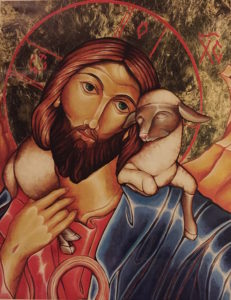
Editor’s note: If you subscribed and did not immediately receive an email indicating that your subscription was complete, please resubscribe below. The link was temporarily broken. Thank you!
The whole mission of Jesus’s life, His incarnation, and the work of the Church is to enable us to attain to the likeness of God, to become who we are, as being made in the image of God. That process of becoming the best version of ourselves, means that we must become the canvas of God. Let the divine artist paint the beauty of His image in you. That beauty of His image in you is irrepeatable and irreplaceable; there will never be another copy of it again. There are no clones in the economy of God’s salvation. There is only one unique you.
As Matthew Kelly says, ‘Be perfectly yourself.’ That is not meant to be self-centered psychology, or a recipe for self-realization. It is thoroughly Christian, in the sense of knowing who we are as beloved children of God. Because how can we love one another as we love ourselves, if we don’t love ourselves in a healthy way?
One of Dostoevsky’s famous expressions is, ‘Beauty will save the world,’ which is quoted by many people who are not necessarily religious. In his contemplation of beauty, Cardinal Ratzinger explains that people usually forget that Dostoevsky was referring to the redeeming beauty of Christ.
How can we love others if we can’t love ourselves? One of the biggest realizations in my growth as a Christian and as a human being, in my healing and becoming more united to Christ was my realization that I didn’t love myself. Even though I believed in God’s love, there came a point of truth when God helped me to know myself, and to learn that I really didn’t love myself. It took a long time to realize this truth, but it was always subconsciously at work in me. I didn’t really accept myself as I was, and there were very human, natural reasons for that.
My parents divorced before I was two years old. My mother had a very traumatic experience, and it was really challenging for her. She bore this difficulty while she carried me in her womb, and by the time I was two years old, they separated. (And I don’t blame her for that). Any child of divorce will admit that they subconsciously blame themselves. Likewise, I thought that the divorce was my fault. I wasn’t even two years old, but the belief was ingrained in me. Without my consciously thinking about it, my self-identity was shaped by my belief that I was the one who caused the separation. I was the one to blame. Thoughts like, ‘Had I been good enough, this wouldn’t have happened. Had I been better, my parents would’ve stayed together’ were subconsciously buried in me, but would only come out in certain occasions.
However, these thoughts were a driving force to my broken self-identity. They didn’t keep me from living a happy life, but there was definitely something I was unaware of, that needed to be healed. As a result of this false interpretation of a painful experience, of assuming the blame for my father’s abandonment, I didn’t fully accept myself for who I was.
Human nature is very complicated. As far as I was concerned, there were no issues or problems brought on by my parents’ divorce. However, it all came to light when I realized that I never accepted who I was, because I always thought of who I should be. I didn’t accept the real me. I accepted the ideal me. As a result, because I couldn’t accept myself with all my imperfections and faults, I had a very hard time accepting others with their imperfections and faults. Because I didn’t love myself in the way God loved me, it was a lot harder for me to love my neighbor as God loves them. This lack of reconciliation with myself led to an inability to love others with a greater power of love. For me, knowing this truth, was a very significant part of answering God’s call to holiness.
If we are going to answer God’s call to holiness, He will not only work in our spiritual lives of piety and prayer. No. We are called to be whole, in spirit, soul, and body, and that means the integration and inner unity of our whole humanity – emotionally, physically, psychologically, relationally, and sexually. Our whole identity is to be embraced in God’s redemptive love. Everything about who we is to be redeemed, filled, and encountered by the light of Christ (to be continued).
May the Lord bless us, protect us from all evil and bring us to everlasting life.
(SOURCE: Denver Retreat, October 2015)
Copyright 2016, Fr. Robert Barcelos. All Rights Reserved
‘Arm yourselves with the armor of faith and the sword of truth. Pray for the grace to forgive and to ask for forgiveness – and for the healing of wounded bodies and souls.’
[sbscrbr_form]
If you liked this post, share it by clicking on one of the social media icons. And if you were inspired or have a prayer request, share that too under the ‘comment’ section!
